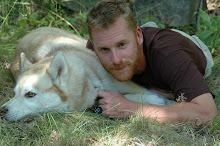 When you're behind the wheel cruising those highways and biways, it's common to glance around at other drivers to see what they're up to. Typically, there are cellphone talkers, self-talkers, nose pickers, makeup artists, and that guy that's just rocking out to some tune, two hands gripped around the streering wheel, head shaking violently back and forth, singing at the top of his lungs. It's always a fun game to see if you can find the radio station playing that particular song, that is if he's not listening to a cd! One of my favourite things to do while driving is listen to CBC Radio 1. And one of my favourite shows is Sook-Yin Lee's DNTO (Definitely Not the Opera). A couple of weeks ago, she explored the topic of water, and what water has meant to various individuals growing up. Most of us who have grown up in Canada will likely have some memory of water, be it swimming at the lake in the summer or those awkward shower moments at the local pool. Because food takes vast amounts of water to grow and produce, I thought I'd explore the topic of water in this particular blog. Specifically, bottled water.
When you're behind the wheel cruising those highways and biways, it's common to glance around at other drivers to see what they're up to. Typically, there are cellphone talkers, self-talkers, nose pickers, makeup artists, and that guy that's just rocking out to some tune, two hands gripped around the streering wheel, head shaking violently back and forth, singing at the top of his lungs. It's always a fun game to see if you can find the radio station playing that particular song, that is if he's not listening to a cd! One of my favourite things to do while driving is listen to CBC Radio 1. And one of my favourite shows is Sook-Yin Lee's DNTO (Definitely Not the Opera). A couple of weeks ago, she explored the topic of water, and what water has meant to various individuals growing up. Most of us who have grown up in Canada will likely have some memory of water, be it swimming at the lake in the summer or those awkward shower moments at the local pool. Because food takes vast amounts of water to grow and produce, I thought I'd explore the topic of water in this particular blog. Specifically, bottled water.Yesterday, Stats Canada just released their findings on Canadians and bottled water. It turns out that 3 out of every 10 households use bottled water as their primary source of water! (Well, I should say used, as the survey was done in 2006). As the environment moves to the forefront of newscasts, and has become the number 1 issue for political platforms, people are reconsidering their decision to dish out that buck and change for a taste of the liquid gold. And when you get right down to it, there are a lot of reasons to discourage us from buying those 600 ml bottles.
First, there is the environment to consider. Obviously, we're moving in a direction away from plastics. And although they are recyclable, Canadian stats showed that 40% of the plastic bottles don't even make it to the recycled bin!
Second, there is the global consideration. Millions of people in the world do not have access to clean water, yet we in North America decide daily to pay for our water instead of getting it free out of the tap.
Third, bottled water is essentially tap water. Ontario in particular, was rated as having the 3rd best tap water in North America. So why do we pay for the stuff?
Our perception of where tap water comes from is misguided, and we have been somehow led to believe that bottled water comes from a cleaner source. Or maybe it's just that we've convinced ourselves of this in this age of convenience.
Provinces, city councils, school boards and even some restaurants are stepping up, and deciding not to buy, sell or drink bottled water. Even politicians in the U.S have committed to head to the fountain instead of the convenience store. It's up to us, the consumer, to stop the trend of bottled water, and start enjoying one of the greatest assets our country has to offer.
Below is the link to CBC's coverage yesterday of this issue.
Pictured above is the Great Slave Lake in the Northwest Territories during a small canoe trip with my buddy Rob!


2 comments:
Hey Colin,
Here are some stats on the amount of water it takes to grow various food stuffs...the numbers are from '96 but I doubt the estimates would have changed significantly.
Water Consumption to produce in California 1 edible pound of...
Tomatoes 22 gallons
Lettuce 23 g
Potatoes 24 g
Carrots 33 g
Apples 49 g
Oranges 65 g
Grapes 70 g
Milk 130 g
Eggs 544 g
Chicken 815 g
Port 1630 g
Beef 5214 g
And some more...
Pounds of Edible Product that can be produced on an acre of prime land
Beef 250
Cherries 5,000
Green Beans 10,000
Apples 20,000
Carrots 30,000
Potatoes 40,000
Tomatoes 50,000
Celery 60,000
Grain Consumption (or where the grain goes!)
Soy: 90% --> grown in US, consumed by livestock
Corn: 80% --> grown in US, consumed by livestock
Grain: 70% --> total US grain products, consumed by livestock
Grain Exports: 66% --> US grain exports, consumed by livestock
Global Grain Harvest: 50% --> consumed by livestock (1980's)
Source: WHY Magazine, 1996. Special Issue in Food Security: World Hunger Year, New York. www.worldhungeryear.org
OK, your 2 week grace period is over. I want to hear more about your authentic culinary adventures! I am so curious to know how ou are enjoying the bounties of July. I would like an update please :)
Post a Comment